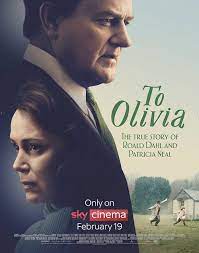
TO OLIVIA
UK, 2021, 94 minutes, Colour.
Hugh Bonneville, Keeley Hawes, Darcy Ewart, Isabella Jonsson, Conleth Hill, Geoffrey Palmer, Sam Heughan.
Directed by John Hay.
While the real-life Roland Dahl and Patricia Neal were world-famous, he with his writing reputation, she with her acting career, this film offers a rather small focus on their lives and relationship, limiting itself to 1961 to 1964, with minimal information about the two prior to these years and no information as to the subsequent years and the struggles, stroke, rehabilitation, campaigning for vaccination against measles, she is one affair, the divorce, his second marriage, death, Patricia Neal living to 2010.
Hugh Bonneville, whom practically everybody knows from his central role in Downton Abbey, offers an interesting, complex interpretation of Dahl. (Although one commentator said he does an excellent Jim Broadbent who, when younger, would have fitted this role perfectly.) Keeley Hawes, best known for television series, physically resembles Patricia Neal. There is an episode where the couple go for help to Dahl’s school mentor, Geoffrey Fisher, the Archbishop of Canterbury who crowned Queen Elizabeth in 1952. Veteran Geoffrey Palmer, in his final film, gives a vigorous performance as a very narrow-minded Anglican cleric.
In 1961, the couple had been married for several years, he establishing himself as a writer of children’s stories, concerned about the lack of success of James and the Giant Peach, experimenting with Charlie and the Chocolate Factory. Patricia Neal had been in films and on stage since the late 1940s. They had met in Hollywood, married, she moving to England, their eventually having five children.
However, there is tragedy. Their eldest daughter, Olivia, still very young, contracted measles and died. There were no vaccinations. The bulk of the film focuses on Roald Dahl and his grief, obsessive grief, extreme grief and its consequences on his behaviour, his treatment of his children, his treatment of his wife, not mentioning his daughter’s name, forbidding others to talk about her, refer to her.
In that context, Hollywood director Martin Ritt arrives offering Patricia Neal the script for what was to become Hud. She is attracted by the script, Dahl thinking it beneath her. Some conflict but she goes to Hollywood taking the children. He eventually follows. For film buffs, there are some interesting sequences where Patricia Neal goes for an audition with the star of Hud, Paul Newman (and actor Sam Heughan doing quite a good impersonation of the young Paul Newman, and suggestions of lookalike).
The time in Hollywood is successful. Dahl is able to write Charlie and the Chocolate Factory and, ultimately, great success and reputation. Patricia Neal won the 1963 Oscar for Best Actress.
Which means that the film ends happily, information about the couple being campaigners for vaccinations for children. (It is not indicate the struggles and the unhappiness of the coming years.)
- Audience awareness of Roland Dahl, his books, film versions, stage versions, musical versions? Audience awareness of Patricia Neal, her Hollywood career, Oscar?
- The time period, 1961-1964? Little background to what went before, Dahl and his war service, writing, marriage to Patricia Neal in the 50s, their five children? No further information as to what happened to them after 1964, Patricia Neal’s stroke, tensions in the marriage, divorce, Dahl’s affair and second marriage?
- The English locations, local, the hall and the encounter with the children, the family home, the countryside, hospitals, funerals? The contrast with the American sequences, Hollywood, the sign, the views, the ocean? Studios, interviews and auditions?
- The focus on Roald Dahl, age, British, experience, success with his writings? His drawing on experiences for his stories? The opening, the children, Gus and his response, the mother and the bet, Patricia being mischievous? The home life, his writing, the background of her Hollywood career? The relationship with the children?
- Olivia, the measles, no vaccination, her death? The sadness of the funeral? The impact of her death on Roald and, not mentioning her name, his grief, withdrawing into himself, the effect on everyone else, the children, Patricia? The attempts to challenge him? His surly behaviour, his writing, wanting Patricia to respond, her praise yet his interpretation, tearing up the manuscript?
- Tessa, her age, with her brother and sister, the death, relationship with her parents, in the shadow of Olivia with her father? Bonding with her mother?
- The visit to Geoffrey Fisher, the glimpse of the coronation of Queen Elizabeth, memories of his role at school for Dahl, the conversation, the hope for help and the marriage? His very narrow outlook on morality and life, religion?
- The visit of Martin Ritt, friendship with Patricia, Roald and his time in Hollywood, the discussions about the script, for Hud? Dahl thinking it below Patricia? Her interest? The tension about her acceptance? Dahl’s behaviour? Patricia leaving, taking the children? Their experience of Hollywood?
- Martin Ritt, his reputation as a director, the Hollywood blacklist, his re-emergence, the casting for Hud, the possible actresses, asking Patricia? Paul Newman as lead? The visit to the studio, Patricia nervous, Paul Newman (and the actor looking like him), the initial audition, a sense of failure, the discussions with Dahl, a new interpretation, her return, effective, Paul Newman accepting?
- Her return to England, pregnancy, the Oscars, her winning? And Dahl writing Charlie and the Chocolate Factory, Patricia’s response, its success?
- An episode in married life, in family life, death of a child, grief, obsessive grief, moving on from grief? No further information about the life of Roald Dahl and Patricia Neal?